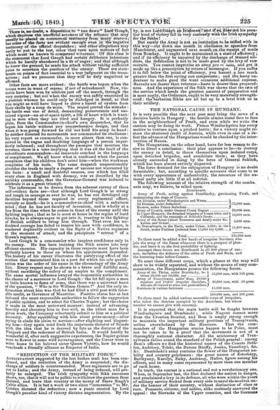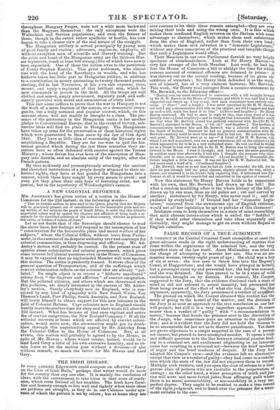THE NATIONAL' CAUSE IN HUNGARY.
IT is very possible that the next post may bring the news of a decisive battle in Hungary : the hostile armies stand face to face in the neighbourhood of Pesth, and even while we write the cannon may be doing its work. Prince Windischgratz has every motive to venture upon a pitched battle; for a victory might re- store the shattered credit of Austria, while even in case ot a de- feat the advance of the' Hungarians would, be checked by the inter- vention of Russia.
The Hungarians, on the other band, have far less reason to de- sire so direct a conclusion : their plan appears to be—to destroy the enemy in detail, to throw themselves upon isolated corps, upon detached brigades, and annihilate them ; as they have already succeeded in doing by the force of General Schlich,
which has been almost entirely dispersed. , The force destined for the subjugation of Hungary is no doubt formidable ; but, according to specific accounts that come to us with every appearance of authenticity, the resources of the na- tional party are little if at all inferior. The following account of the relative strength of the comb& ants may, we believe, be relied upon. AUSTRIANS.
Army of Pesth, acting against Dembinsky, garrisoning Pesth, and maintaining the siege of Comorn.
1st Division, under Windischgratz and Wrona 2d Division, under Jellachich
Reserve, under Prince Serbelloni 175,000 men.
Army of Croatia, under General Count Nugent 24,000 men. In Upper Hungary, the detached brigades of Count,Gotz and
Colloredo, and the remnants of Schlich s forces Army of the Banat (about Temeswar and .Arad) under Ba- lmy= and Graser, In Transylvania, in the North, under Urban, 3,000; in the South, under Puchner (reduced from 15,000 to) 8,000 Total. 125,000 men
To these must be added a few bands of irregular Servians, who join the army of the Banat whenever there is a prospect of plun- der, and leave it on the first probability of fighting.
Amongst these forces are distributed in all 300 pieces of can- non, including the defences of the cities of Pesth and Buda, and the battering train before Comorn.
To meet these different corps, which a glance at the map will show to be widely separated, and without the means of easy com- munication, the Hungarians possess the following forces.
Army of the Theiss, under Dembinsky, be- 55,000 men, with 150 guns. tween 50,000 and 60,000, say Army of Transylvania, under Bern, 20,000
regulars and 10,000 irregular Szecklers, 30,000 men, with 38 guns. who are all trained to arms and good soldiers Garrisons in various fortresses 15,000 men.
100,000 men, and 188 guns. To these must be added various moveable corps of irregulars, who infest the districts occupied by the Austrians, but whose number we cannot give with accuracy.
It is expected that the main battle will be fought between Windischgriitz and Dembinski ; while Nugent cannot move from the Croatian frontier, and Bern is amply strong enough to maintain the important military positions of Transylvania, unless overwhelmed by the Russians. That the com- manders of the Hungarian armies happen to be Poles, must not be taken to be a proof that the movement is not of a thoroughly national character. All the aristocracy of Tran- sylvania rallies round the standard of the Polish general : among Bem's officers we find the historical names of the Counts Beth- len, Andrasey, Teleki, the Barons Banffy, Tosika, Vesselenyi, Stc. &c. Dembinski's army contains the flower of the Hungarian no- bility and country gentlemen : the great names of Eaterbazy, Batthyany, Karolyi, Zichy, Andrassy, Haller, figure among his officers, and in many cases represented by more than one member of each house.
In truth, the contest is a national and not a revolutionary one. When, in September last, the Diet declared the nation in danger, and proclaimed a levy in its defence, all who were within the years of military service flocked from every side to enrol themselves un- der the banner of their country, without distinction of class or race. Peasants, citizens and nobles, alike zealously answered the appeal : the Slovacks a the Upper counties, and the Germans
10,000 men. 5,000 men. 11,000 men.
throughout Hungary Proper, were not a whit more backward than the Magyars themselves : the only exceptions were the Wallachian and Servian populations; and even the former of these, though in the outset either apathetic or hostile, has now begun to take a clearer view of the real nature of the struggle. The Hungarian artillery is served principally by young men of good family and station ; advocates, engineers, employes, all without exception men of scientific and literary training. But the pride and boast of the Hungarian army are the thirteen Hus- sar regiments, (each at least 800 strong,)five of which have newly been organized. One of these the nation owes to the patriotism of Count Stephen Karolyi. This great nobleman, who almost vies with the head of the Esterhazys in wealth, and who has hitherto taken but little part in Hungarian politics, in addition to a contribution in money amounting to twenty thousand pounds sterling, did in last November, at his own sole expense, raise, mount, and equip a regiment of this brilliant arm, which he now commands in person in the field. All the troops are well clothed and armed, amply provisioned, regularly paid; and suffi- ciently provided with stores and ammunition of every kind. This fact alone suffices to prove that the war in Hungary is not the work of a mere fraction of the nation, or a democratic propa- ganda, but a truly national and popular contest, which, on this account alone, will not readily be brought to a close. The pre- sence of the aristocracy in the Hungarian ranks is but another pledge to Constitutional Europe, that in the event of victory, sub- versive ideas will find no place in Hungary. The Hungarians have taken up arms for the preservation of those historical rights which were guaranteed to them anew by the law of 11th April 1848. They have as little idea of renouncing the Dynasty as of establishing a Republic. They are far too wise to quit the his- torical ground which during the last three centuries their an- cestors have so often defended with success against the Vienna Ministry ; whose dream has ever been of the absorption of Hun- gary into Austria, and an absolute unity of the empire, after the French pattern.
By thus recklessly and presumptuously attacking the ancient and cherished institutions of a people deeply attacned to their in- herited rights, they have at last goaded the Hungarians into a contest, which these have sought by every means to avoid : and even yet they place their only hope of restoring order, not in justice, but in the superiority of Windischgriitz's cannon.



























 Previous page
Previous page